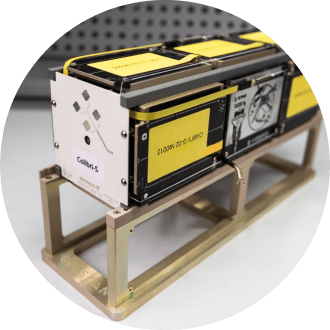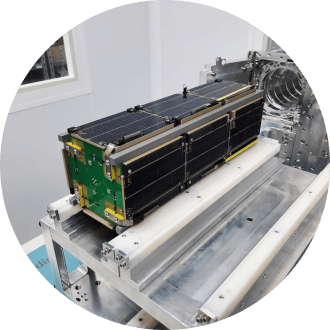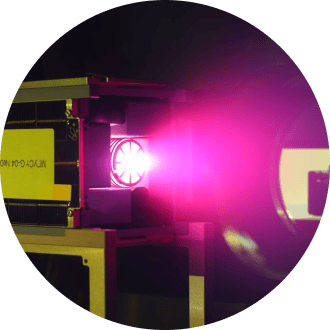StratoSat TK-1
The “matryoshka”-format satellite, which delivered six TinySat picosatellites into orbit

The StratoSat TK-1 spacecraft is a satellite created for the Stratonautica company based on the truncated Geoscan 3U satellite platform. One of the three units is a transport container for delivering six picosatellite-class spacecraft of the TinySat format to low Earth orbit. Picosatellites are available in two sizes: the TinySat 1TU format, a cube with a 5 cm side (four units), and the TinySat 2TU, a rectangular block with dimensions of 5x5x10 cm (two units). They are made by the Small Space Systems company and are intended for educational programs. Each picosatellite operates with an independent power supply system and is equipped with an onboard radio transmitter (436.260 MHz in LoRa mode) and a camera.
The process of satellites exiting the transport container was captured on July 11, 2023, using high-resolution photo and video cameras installed on the central unit. Two of the three cameras were developed and assembled by Geoscan: the divergence of the devices in the video was captured by the Geoscan HRCAM-S wide-angle camera, and the Geoscan HRCAM-M with a telephoto lens is used for photographing the Earth.
Colibri-S
Hyperspectrometer-equipped Earth remote sensing satellite

Satellite based on the Geoscan 3U platform, designed for remote sensing of the Earth. Created for S.P. Korolev Samara National Research University. As the payload, the device is equipped with a scanning slit-type hyperspectral camera measuring 10x15 mm that operates in the visible range, with a diffraction optical element based on a grating on a convex mirror with a Jupiter 3.5/135 mm lens. Its swath width is approximately 60 km with a spatial resolution of about 60 meters per pixel.
Horizon
CubeSat with student’s experimental developments

A small satellite developed for D. F. Ustinov Baltic State Technical University “VOENMEH”. Designed for remote sensing of the Earth, studying the effects of radiation on electronic components, and testing an active attitude control system based on reaction wheel motors.
- module for studying the degradation of characteristics of solar panel of various compositions under the influence of space environment factors;
- module for electronic component research: magneto-resistive RAM chips tested for resilience in space radiation conditions;
- CubeSat attitude control unit based on electric motors;
- Payload management system: transceiver modules operating in UHF and S bands, computing unit with a 3840х2160 px camera.
TUSUR GO
Spacecraft for an inter-satellite communication experiment

Satellite for Tomsk State University of Control Systems and Radioelectronics. Performs flight tests of a satellite communication device for transmitting data from monitoring units to a ground terminal, including the capability for relay through other spacecraft.
- Transceiver module for ensuring the inter-satellite communication channel with the RTU MIREA1 satellite;
- GNSS receiver in the L1 frequency range (GPS, GLONASS), E1 Galileo;
- Camera module: field of view (FOV): 66 degrees, resolution: 2 MP.
Vizard-ion
Small spacecraft for ionosphere studies

CubeSat for MGU-STANDART company. Part of the VIZARD.space constellation, this satellite is intended for flight tests of the VERA plasma propulsion system and reception of signals from GNSS/GPS global navigation satellite systems for ionosphere studies.
- 1632x1232 (2 MP) camera;
- GNSS/GPS global navigation satellite systems signal receiver;
- VERA ablative pulsed plasma thruster.
Educational Partner: State Budgetary General Education Institution of the City of Moscow “V. I. Churkin School No. 1522”.
RTU MIREA1
Ionosphere research satellite

Satellite of the Russian Technological University MIREA. Designed for flight tests of the visible-range optical camera and reception of signals from GNSS/GPS global navigation satellite systems, conducting an experiment on inter-satellite communication using a transceiver module.
- visible-range opto-electronic equipment;
- transceiver module for inter-satellite communication channel with the TUSUR GO CubeSat;
- onboard navigation receiver for GNSS/GPS global navigation satellite systems’ signals.